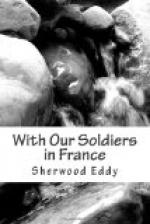It has been repeatedly affirmed that not more than 20 per cent of the men now under arms among the British troops were connected with the churches in any vital way before the war, or were regular in attendance at their services. Of this minority perhaps a half—those who were weak or nominal Christians before the war or have lost the higher standards of peace time or have hidden whatever religion they may have had—would not now be classed as definitely Christian men. But the remaining half, or one-tenth of the total number in the army, would probably be out-and-out Christians, strengthened by the severe discipline of the war and living under distinctly Christian standards.
At the other or lower extreme, there are perhaps one-tenth who are so-called “rotters,” the men who set the evil standards of the camp and whose conduct is almost altogether selfish and materialistic. Between these two extremes are the great majority, or four-fifths, whom it is so difficult to classify. It is our conviction that these men “are not saved, but are salvable.”
What are the moral standards of this majority? They are not definitely Christian. Rather, they have a military, material standard of the type of a somewhat primitive social group. Their expressions unconsciously reveal their judgments. Their constant demand of one another is “to play the game,” that is, to play fair and to do one’s part in order to win the game for the good of all. Anything which harms, hinders, or endangers another, which brings suffering to one’s fellows or defeat to one’s side, is not playing the game. They condemn unmanly actions which bring defeat, and praise the practical and virile virtues. As one chaplain writes: “I believe nearly all live partly by faith in a good God. I have never found men afraid to die, even though they were afraid before battle. As to the standards by which they live, I should say they are the sanctions of group morality. They have very lax ideas about drunkenness and sexual irregularity, but they have very strict ideas about the sacredness of social obligations within the groups to which they belong. I would mention sheer fear of public opinion as one of the great weaknesses of the men. They would rather be in the fashion than be right. And most of them have been hardened—though not necessarily in a bad sense.”
As we ask ourselves what are the virtues which the majority admire in others and practice themselves to a greater or lesser degree, we would say that they are chiefly five:
1. Courage or bravery, the first virtue of the ancients and always at a natural premium in war time, is admired by all. In countless instances in the camps or on the battlefield this rises to heroism or self-sacrifice. Cowardice is scathingly condemned, and the man who starts to run away on the battlefield is unhesitatingly shot down by his comrades to preserve the morale of the fighting body.




